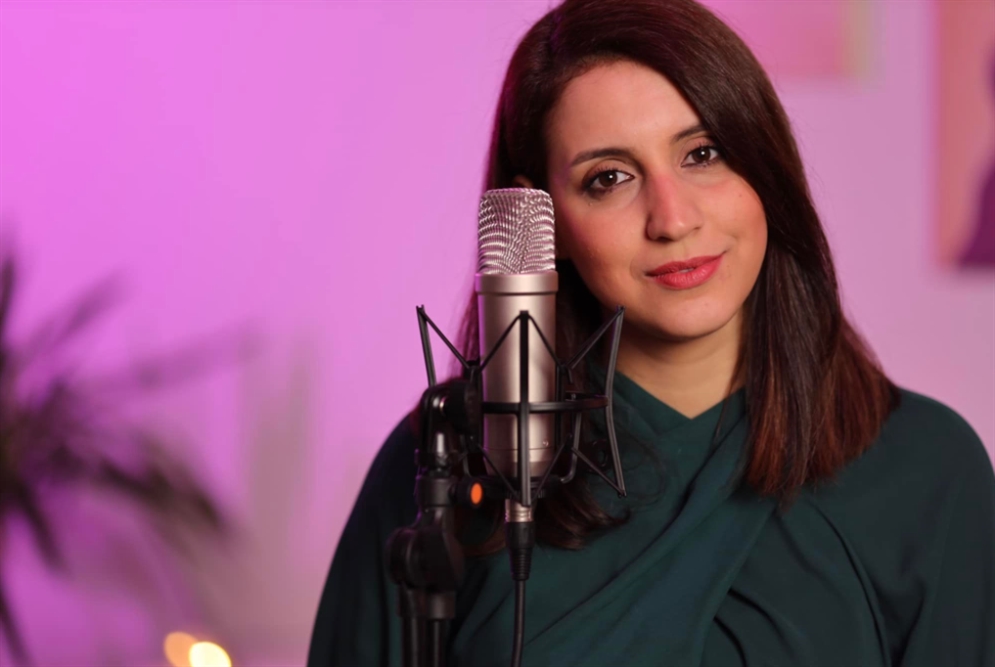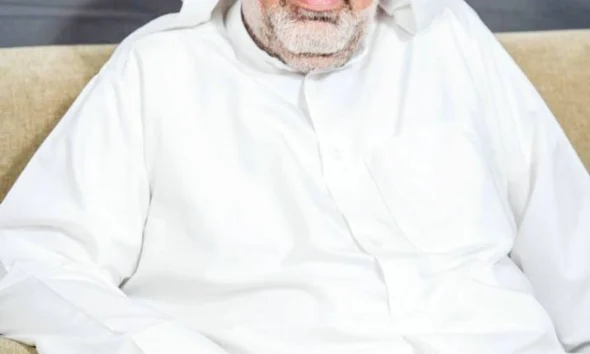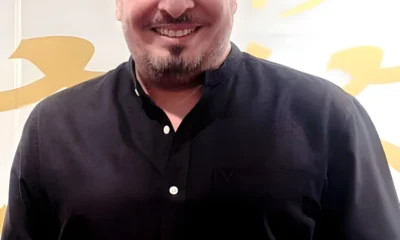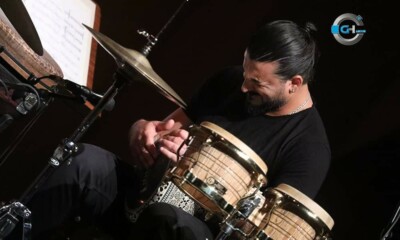Home » Interviews » Artist Carmen Tockmaji from Syria says to Arabisk London: “I Communicate with the World Through Art”
Interviews
Artist Carmen Tockmaji from Syria says to Arabisk London: “I Communicate with the World Through Art”
Published
12 months agoon
By
Huda
Carmen Tockmaji is an exceptional artist. She is a multifaceted artist who is proficient in many genres and has a passion for all of them that is not confined to any one field but rather views it as her high purpose of reaching out to the world.
Along with the scent of her autonomous creativity, Carmen’s diverse body of work reveals her unique spirituality and attests to the depth of her skill, which she meticulously honed to become one of the Higher Institute of Music’s inspirations.
In addition to being a talented vocalist, Carmen Tockmaji also writes her songs, manages her company, and works as an art instructor and coach. Not only did the public appreciate her for her sophisticated work that encompasses her sentiments and culture, but it also followed the rhythm of her wishes—past and present—yet she did not want recognition. Instead, celebrity was thrust upon her.
Carmen Tockmaji discusses her love of the arts and her early days as a teacher at the Higher Institute of Music in this interview with “Arabisk London.” She shares insights into her personality, her success factors, and the difficulties she has while balancing fine work with the demands of fame and fortune.
Interviewed by Beida Qatlish
-
How do you describe yourself as an artist? How did you start singing?
I can’t confine myself to describing a singer since music is my life, fully realised in every aspect.
In addition to managing my work, I write my music, collaborate with a select group of musicians on songwriting, and help other vocalists find their voices and their musical identities.
I am an artist who is passionate about all kinds of art, and I display my works to fulfil my need as a person who finds art to be the most effective means of expressing his emotions and ideas.
I am grateful to my family for fostering my lifelong passion for music. Even though my father has never studied music, he is an experienced listener, and I still consult him on all matters about music.
My guitar adventure started because my mother thought it was important for kids to learn music at an early age in addition to academic subjects.
My grandma had a lovely voice, by the way. Before my singing career took off and I entered the Higher Institute of Music to study classical and operatic singing, I had no idea that I had inherited it from her. My musical godfather, the late Professor Hossam El-Din Primo, saw potential in my voice and taught me to read music and sing.
-
What are the things that inspire Carmen Tockmaji in her artistic work?
The source of inspiration is an unquenchable flame. It’s not constrained by time or location, nor is it tied to a particular purpose.
It might originate from an ephemeral recollection, an intense emotion, a motivating individual, or anything else that ignites the soul’s desire.
My words seem to turn into songs that convey my emotions when I write to and about Damascus, which serves as my inspiration every time I miss it.
I refer to all the people, places, and emotions that are connected to “Damascus” rather than just the actual location.
Love, grief, and loneliness are what Damascus embodied. Pain feeds the creative spark and turns words into melodies and poems.
-
Your career as an artist was not without its difficulties. How did you get through them?
Challenges are an artist’s constant companion and an essential component of his artistic career.
My artistic life, like any other artist’s, has been fraught with difficulties, which I overcame with determination and perseverance.
I worked hard to show to myself, and then to the rest of the world, that I could achieve success from nothing.
When I abandoned my pharmacy degree to pursue singing as a profession and a life goal, I challenged society.
Life’s problems motivated me to be creative, therefore I turned my experiences into content for my artwork.
However, the most significant obstacle that I am proud of is that I am an independent artist who is dedicated to my ideals.
This commitment can often impede output and force me to take slow steps away from the clamour and bustle of celebrity.
Nevertheless, this challenge makes me feel incredibly proud of what I’ve done and will achieve in the future.
-
Which song do you believe has had the most influence on your artistic career?
There were two songs that I performed that were watershed moments in my musical career and opened doors I never expected.
The first song is the theme song for the series “Dabo Al-Shanati,” titled “My Journey to Any Country,” composed by poet Iyad Al-Rimawi.
This song came to light at a crucial point in my life, and it helped distinguish me as a brilliant vocalist in the creative community.
The second song, “Move Your Heart,” is my first unique song, written in partnership with my brother Bernard Tockmaji.
This song marked the beginning of my independent artistic endeavour and established that I am more than simply a vocalist; I am an artist with a distinct artistic vision.
These two songs helped me build confidence in myself and my skills, allowing me to take my first steps towards success.
-
Tell us about your album “Bala Salam”; why did Carmen Tockmaji choose this title, and what message do you hope to communicate with it?
“Bala Salam” is a brief musical album that conveys the experience of seeking inner peace.
Six tracks on the album, which were all recorded in the Syrian dialect, stand out for their variety of jazz, rock, and classical influences.
These songs, which convey my inner thoughts and experiences, are different from my earlier works in terms of language, melody, and style.
Bernard Tockmaji and Nareg Abadjian worked on the music production, while photographer Amr Lakmoush captured the tunes.
The album title, “Bala Salam,” is a reflection of the ongoing quest for inner peace that each song seeks to convey.
It represents a milestone in my artistic career since it is unlike anything I have previously released or what is now popular in the Syrian music industry.
The album stands out for its strong connection to reality, as I deliver for the first time songs with words that speak about my personal experiences and sentiments, transforming concepts that have crystallised over the years into entire music.
The album’s topics reflect contemporary events and explore human daily lives, issues, and thoughts.
-
Does Carmen Tockmaji have any artistic collaborations with other artists?
I feel that collaboration among artists is important because it often yields wonderful and unexpected results. My next collaboration will not be with a vocalist, but with one of the Arab world’s most prominent composers and musicians, Mr. Raad Khalaf, with whom I am honoured to collaborate.
-
Do you want to pursue careers in acting or writing in addition to singing?
My entire focus is on the music right now.
I will, however, thoroughly consider and assess any option to attempt a different sector, and if it aligns with my interests and skills, I will embrace it.
-
Do you believe that young people still like singing in classical Arabic? What challenges do female vocalists of classical Arabic music face?
It’s a common misconception that singing in classical Arabic is not appealing to younger listeners.
However, the evidence shows that this is not the case, since a sizable audience enjoys this kind of art and engages with it in remarkable ways at concerts and on social networking sites.
In my artistic career, I’ve encountered several challenges when it comes to singing in classical languages or any other genre that involves committed music.
The most significant of these challenges is the absence of assistance from any organisation or group, although all production businesses invest in various musical genres that are more well-liked by the general public.
However, I think that a sublime message may be conveyed via devoted and purposeful art, and the artist must work tirelessly to communicate it.
-
Does Carmen Tockmaji want to explore different musical genres in the future?
Even though I studied classical and Eastern music, I grew up in a musically inclined household and received exposure to a wide variety of musical genres, including jazz, rock, alternative, and classical music.
This variety shaped my taste in music and helped me to value and like all genres.
The tracks on the “Bala Salam” album showcase this versatility, as they blend many musical genres to provide a distinctive soundscape.
-
How, in your opinion, may music alter reality or raise consciousness? With your song, what message are you attempting to convey?
An authentic artist resonates with his audience, conveys his ideas openly and imaginatively, and becomes a voice for them, translating their suffering and hopes.
I’ve been experiencing a profound internal struggle in the past several years, which has made me feel contradictory. Singing is the greatest method I know to chronicle these sentiments.
To connect with everyone similar to me in this world and sing together about love, loneliness, regret, and the innocent things that we have lost in the pace of time, I hope that my new album will be distinct from anything I have previously presented.
I hope that my voice will become a tool for everyone who has lost their voice. I will sing about simple folks on this album since I am one of them and I sing just for them.
-
What advice would you give young people wishing to go into the music and arts industries?
Although it presents many obstacles and problems, the world of art is interesting.
My recommendation is to pursue your artistic passion and succeed in it rather than chasing trends.
True creativity endures for many years, but fame is ephemeral and may instantly elevate or depress an artist.
-
How does Carmen Tockmaji respond to criticisms and unfavourable remarks about your work?
Unfortunately, a troubling trend that artists are presently having to deal with is the rise of unrelated personal criticism of their artistic creations.
The artist is under a lot of strain from this kind of criticism since it doesn’t assess the artist’s talent but rather concentrates on his personal life, looks, attire, remarks, and family.
I make a strong effort to keep much of my personal life and my family secret, however, I do occasionally post some pictures from it.
Since I am a very picky and careful person, I think that art should represent the artist in front of the viewer.
Although an artist may never, please everyone, he can welcome criticism with open arms and remain unaffected when he is pleased with the work he has produced.
I am thrilled that I seldom come across criticism of my work, and I am proud of all of my supporters and admirers, from whom I have only ever gotten admiration and encouragement.
-
Aside from your genre, is there a specific kind of music you enjoy listening to?
My love of the arts extends beyond just creating original music; it also includes listening to a wide variety of musical genres.
My father introduced me to rock music as a child, and I have memorised heritage songs. I enjoy Rehabna music and can sing in up to 15 languages.
I studied operatic singing before moving on to oriental singing, and this variety of study and listening has left me open and responsive to any new style or experience that comes my way.
-
Do you have any intentions to attend overseas performances or events soon? What is your ultimate career goal?
My current focus is on publishing my record, which has been delayed owing to several unanticipated events.
Additionally, I am continuously looking for opportunities to host concerts and participate in large festivals.
You may like

Nammos Resort AMAALA: KSA’s New Address for International Luxury Hospitality

Muhammad Mahfouz: Trump will Respond to Riyadh’s Ambitions, and We Must Develop a Gulf-Arab Project with Iran

The World Stadiums & Arenas Summit 2025 has Arabisk London – Saudi Arabia as a Media Partner

Laheq: The First Private Saudi Island to Obtain Light at Last

The “New Square” Alters the Modern Life’s Notion in Riyadh












